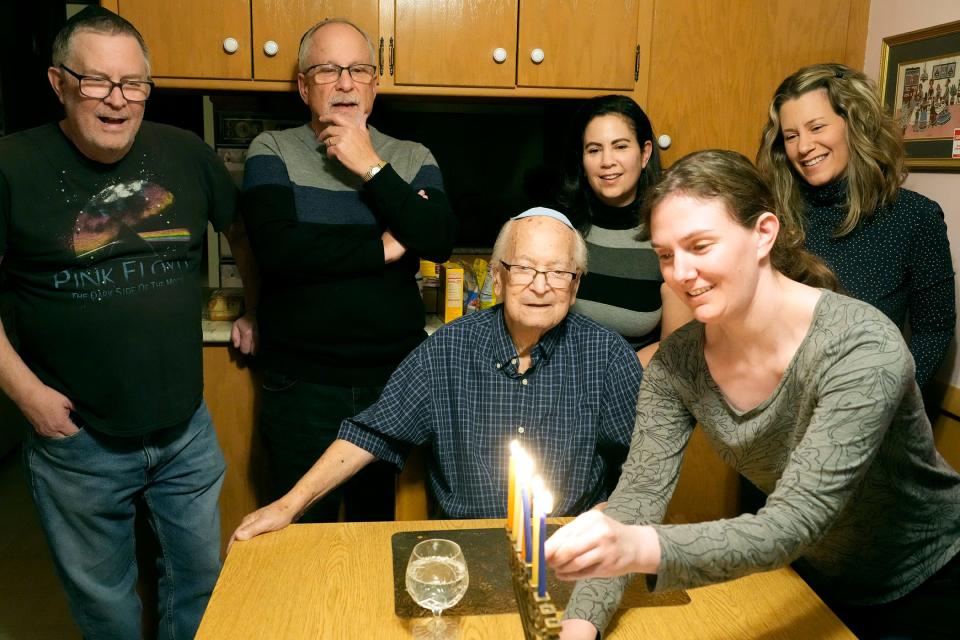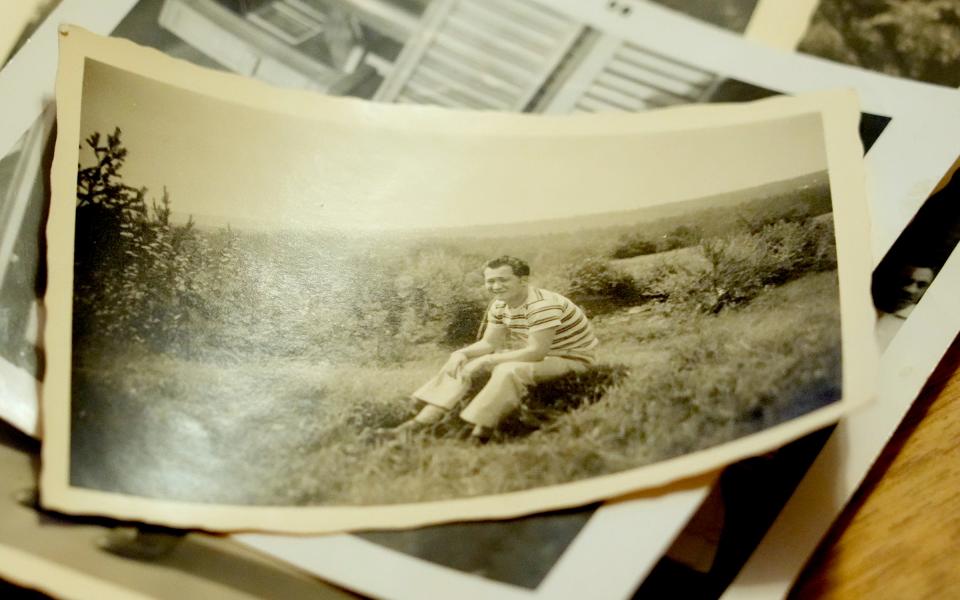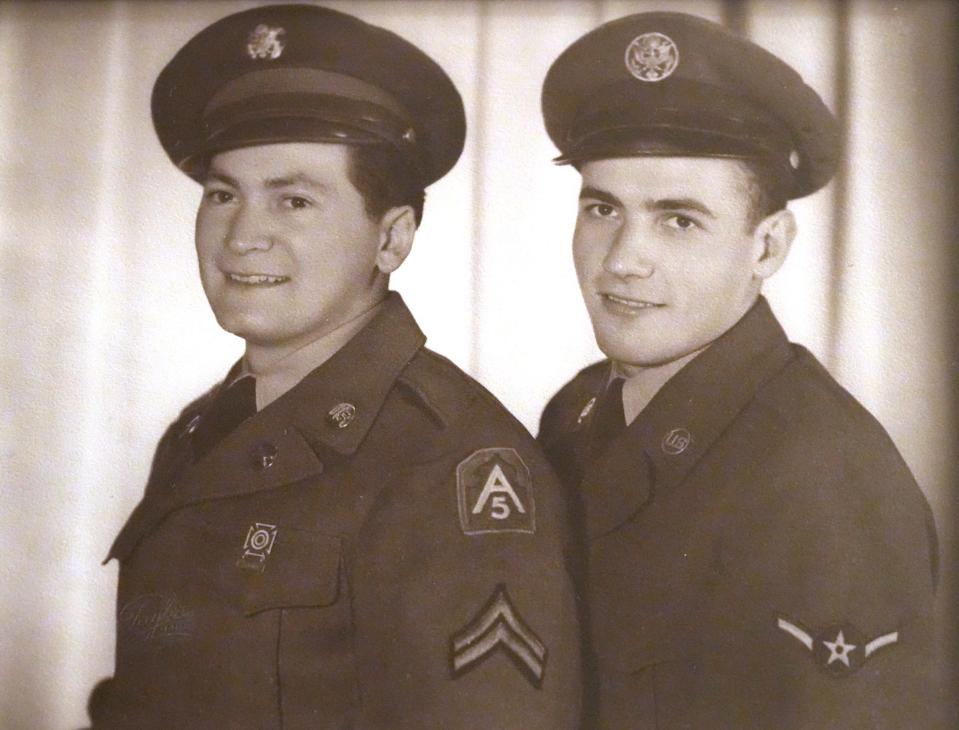Holocaust survivor, 95, reflects on camps, life after war as he celebrates Hanukkah with family
Every time Holocaust survivor Albert Beder tells the story of his life, his four adult children learn something new.
At 95, Beder has a remarkable memory for the details of his childhood in Lithuania, the ghettos and labor camps he was forced into as a teenager and the people he met as he fought to survive.
As his family gathered Tuesday at his Bayside home to celebrate the sixth night of Hanukkah, it also marked 76 years to the day that Beder arrived in the United States to start a new life as a 19-year-old orphan.
Beder for over 15 years has been sharing his story with students across Wisconsin as a speaker for the Nathan and Esther Pelz Holocaust Education Resource Center. He told it again Tuesday. His children know much of what he endured, but they cherish the new details he reveals each time.
"It's an old story, but it never gets old," said his son, Gary Beder.

Childhood interrupted by World War II
Born in 1928 in Kovno, Lithuania, then the country's capital, Beder was one of six children. His family was poor and lived in a small flat. His parents and three sisters slept in the apartment's single bedroom, while he and his two brothers slept on a couch in the front room.
Antisemitism was common, he said, and he was pushed around and called names as a Jewish child.
When he was 13, his family was among the 35,000 Jews rounded up and forced into the Kovno ghetto in August 1941.
"The rations were very small, and it was a very cold winter," he said. "We didn't get wood. We burned up all the fences."
His youngest sister, Reva, then 6, got separated from the family as they tried to flee the invading Germans, but she survived thanks to the care of a Lithuanian couple who took her in. She now lives in Los Angeles.
Beder had been away at a summer camp near the border with Latvia. Soldiers massacred all the adult men, and Beder tried to run away, but he was caught and taken to the Kovno ghetto.
One of Beder's most-recounted anecdotes is that of his prized stamp collection. In the ghetto, guards confiscated gold, silver and other valuables. Since he was 7 years old, Beder had saved stamps from around the world he purchased from a nearby bookstore. He didn't want to turn the collection over to the guards, so he burned it.
From the ghetto, he was taken to a series of forced labor and concentration camps. In a labor camp in Riga, Latvia, his father, Jacob, died. Beder was put to work on a farm alongside other children. There, he met Howard Melton, who would go on to be his lifelong friend.
"I was 14, he was 11. But he was a little taller," Beder said. "We stuck together from that day on in Riga."
Together, Beder and Melton survived the Stutthof camp, then a subcamp of the infamous Dachau complex, then the postwar chaos in Europe. They both immigrated to Milwaukee and remained best friends until Melton's death from COVID-19 in 2021.
In Stutthof, a camp in current-day Poland, Beder was separated from his family. He could see once in a while his mother and two older sisters through the barbed wire between the men's and women's camps.
"Hang in there," his mother told him in Yiddish the last time they saw each other. There wasn't much else to say.
His mother, Rochel, was killed at Stutthof along with all women over 40. He doesn't know how she died.
He would never see his older sisters, Luba and Golda, again. They survived the war but died soon after from disease. One brother, Pesach, died in the Soviet army, and another, Lazar, survived the war in Russia and later settled in Cleveland.

Albert Beder, best friend survived inhumane camp conditions
At the Utting camp — a subcamp of Dachau, about 30 miles away — living conditions were dire. Beder and Melton slept in an open sort of barracks that consisted only of boards on the ground. The teenagers shared their two blankets: one to lie on, and one to cover them.
"The big problem was lice because we didn't have any hot water or soap," he said.
Beder and other prisoners were forced to work in a factory making heavy concrete columns and walls for the German war effort.
While earlier he had been given soup twice a day and bread to share between four people, in early 1945, "things were getting worse," he said. There were 10 people for each loaf of bread and soup only once a day.
"Many times, the bread was moldy. All you could do was break it in crumbs and divide the crumbs," he said.
He will always remember a package from the Red Cross that arrived at Utting in March 1945, just one month before the camp would be liberated, as many inmates were close to starvation. It contained cans of condensed milk, crackers and sugar. The sugar he could trade with the kitchen workers for an extra bowl of soup.
He is reminded of that package every time he sees condensed milk in the grocery store.
"They were lifesavers," he said.
In late April, just days before U.S. forces would liberate the camp, guards forced Beder, Melton and other prisoners to march to Dachau. It took two days. From Dachau, they led thousands of prisoners on another grueling, days-long march. On this so-called death march, the Germans shot anyone who couldn't keep up.
Beder recalls being marched into a ravine on the 10th day. He expected they would all be shot and killed. One guard with a loud voice shouted often during the march, "Five minutes to midnight, you'll be shot." The implication was they would be killed before the war ended.
In the ravine, the waiting prisoners lay on the ground and slept. They woke up the next morning covered in snow. The guards had left.
"We were free. The Germans were gone," he said.
The postwar period brought more challenges. Beder and Melton contracted typhoid and were moved to a series of hospitals and camps for displaced persons across Germany. Eventually, they found jobs in Munich and a place to stay with two other boys who had survived the Holocaust.
In 1947, President Harry Truman announced that orphans 19 and younger could come to the U.S. Beder was 19; he applied and traveled by ship in December to New York City.
Because the Hebrew Immigrant Aid Society paid his $178 ticket for the trip, he has donated to the group many times over the years in an effort to pay the group back for its gesture.
More: Wisconsin Holocaust survivor Nate Taffel remembered for teaching love over hate

Building a life in the U.S. after the Holocaust
Beder spent less than two weeks in New York City before someone told him about Milwaukee. The man handed him a ticket, and he accepted it. Because Beder didn't speak English well yet, it appealed to him that there were German-speakers there. A few years later, Melton arrived in Milwaukee too.
They built lives and started families here. During the Korean War, Beder was drafted to the U.S. Army and was stationed in Germany to work with youth. Back home, he went on to marry a Milwaukee woman named Ruth. They were married 60 years and had four children. He worked as a "furnace man" for five decades.
Beder treasures memories of the cruises and trips he took with Ruth, Melton and his wife, Evelyn. He returned to Europe in 1988 and visited Dachau and some of the other places he was taken during the war.
"I think I lived a very good life," Beder said. "I always say, I was the luckiest guy."
For a Holocaust survivor to call himself lucky might sound weird to some, his children acknowledge. But it's how he views his life.
"I think he had four years of hell, and then after that it was automatic, it's like, 'Let's live, let's enjoy life,'" his son, Jeff Beder, said.
His daughter, Melissa Spanjar, agreed: "Some people would be bitter, and he's not bitter."
The experience does, however, stay with him. Hamas' attack on Israel in October and the ensuing war has upset Beder greatly. The killing of 1,200 Jewish people is "sick," he said, and he feels echoes of the Holocaust.
When he tells his story with the Holocaust Education Resource Center, a program of the Milwaukee Jewish Federation, Beder always says: Hate is a terrible thing.
He chose to begin speaking publicly because "people are writing books that these things never happened," he said, referencing Holocaust deniers.
People like to call Beder "Honest Al" or "Friendly Al," a testament to his humble spirit and good nature.
"It's hard to believe that he's a better person than he would've been because of that experience, but who knows? From great adversity comes greatness," Gary Beder said.
As a child in Lithuania, Beder didn't celebrate Hanukkah with much fanfare. Maybe an aunt or a grandma gave him 10 cents as a gift, he recalled. With widespread antisemitism, giant menorahs certainly weren't set up around the city.
But in the U.S., celebrating with family, it has come to mean much more to him. On Tuesday in Bayside, he marked the holiday in the home where he has lived for nearly three decades. With a cartoon Hanukkah decoration hanging from the window behind them, his four children, a granddaughter and a great-niece gathered around his kitchen table to light the menorah and sing the traditional prayers.
Beder has gone through so much, and he's still here. His family holds these moments dear.
"To have him at 95 years is amazing, just like him," Gary said.
This article originally appeared on Milwaukee Journal Sentinel: Holocaust survivor Albert Beder reflects on labor camps, life in war

